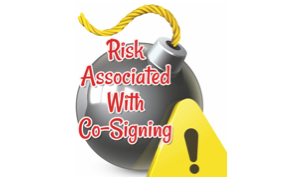July 25, 2018
Shawn Lane
Consumer Credit Expert
Most credit questions asked of me can be answered exactly the same. “It depends…”
Question: How will an inquiry impact my credit?
Answer: “It depends”
Question: How will opening a new credit card impact my credit?
Answer: “It depends”
Asking how co-signing impacts your credit is no exception. The effect which co-signing for a loved one is going to have on your credit will vary based upon a variety of factors. However, when it comes to co-signing, the potential for a negative credit impact is extremely high.
Potential Credit Score Damage
The idea that being “just a co-signer” does not mean that you are somehow less responsible for the debt than the primary borrower. In fact, when you co-sign for someone else, the account will show up on your credit reports as if you were the sole borrower. There are several ways in which co-signing could damage your credit scores.
1. The Inquiry
Merely applying to be a co-signer might impact your credit scores negatively. Whenever you apply for a loan, a lender will request a copy of your credit report(s) as part of your application review. The credit pull will appear on your report(s) as a “hard inquiry” and could damage your credit scores, although probably only slightly.
2. Utilization and Balance
Co-signing could also damage your credit scores due to the outstanding balance of the new account. Credit scoring models like FICO pay attention to the number of accounts which appear on your credit reports with outstanding balances. The higher the number, the worse the impact.
The bigger problem with co-signing, however, occurs when a credit card account is involved. While the number of accounts with balances on your reports will have a smaller impact on your credit scores, the revolving utilization ratio on the credit card accounts can have a bigger impact. If you co-sign for someone else’s credit card account and they fail to pay off the balance monthly, an outstanding balance will appear on your credit reports. That outstanding balance will drive your revolving utilization ratio upward, a fact which could damage your credit scores significantly since 30% of your credit scores are largely based upon your revolving utilization ratio.
3. Late Payments and Default
The biggest potential for credit score damage from co-signing happens when your loved one fails to pay the account as agreed. Late payments on the account will show up on your own credit reports and can drive your credit scores downward quickly. This is because 35% of your FICO credit scores are based on the “Payment History” category of your credit reports. If the account you co-signed for has a history of late payments or default, your own credit scores will suffer greatly.
Alternatives to Co-Signing
After reading the above article you have probably come to the conclusion that co-signing is a bad idea. (If you came to another conclusion, please read the above again.) Yet you can still help out your loved one in another way without jeopardizing your own credit. By adding someone as an authorized user to your existing, positive credit card account you might help that person to build better credit for him/herself. And, as long as you don’t issue them a card this will not impact your credit negatively.
An authorized user account is not going to be a cure-all and your loved one may still need help from a credit repair professional before they can begin qualifying for financing alone, but it can be a great first step in the right direction. However, no matter how much you care for the person who is asking you to co-sign, the answer should always be a firm “no.” Co-signing is simply too dangerous of a risk.
If you or a loved one need professional credit repair help, CLICK HERE to schedule a free credit analysis today.

